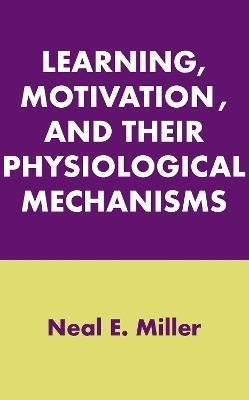
Learning, Motivation, and Their Physiological Mechanisms
AldineTransaction (Verlag)
978-0-202-36143-7 (ISBN)
Neal E. Miller (1909-2002) was a professor of psychology at Yale University and professor and head of a laboratory of Physiological Psychology at the Rockefeller University. He is a past president of the American Psychological Association, an elected honorary fellow of the British Psychological Society, and chairman of the National Research Council Committee on Brain Sciences. He is co-author of four books and author of many articles.
Part VII: Learning; 22: The Perception of Children: A Genetic Study Employing the Critical Choice Delayed Reaction; 23: A Reply to “Sign-Gestalt or Conditioned Reflex?”; 24: Agitated Behavior of Rats During Experimental Extinction and a Curve of Spontaneous Recovery; 25: Integration of Neurophysiological and Behavioral Research; 26: Conflict Versus Consolidation of Memory Traces to Explain “Retrograde Amnesia” Produced by ECS; 27: A Brief Temporal Gradient of Retrograde Amnesia Independent of Situational Change; 28: Different Temporal Gradients of Retrograde Amnesia Produced by Carbon Dioxide Anesthesia and Electroconvulsive Shock; 29: Secondary Reinforcement in Rats as a Function of Information Value and Reliability of the Stimulus; 30: When Is a Reward Reinforcing? An Experimental Study of the Information Hypothesis; 31: Effect of Strength of Drive Determined by a New Technique for Appetitive Classical Conditioning of Rats; 32: Classically Conditioned Tongue-Licking and Operant Bar Pressing Recorded Simultaneously in the Rat; 33: Evidence for Positive Induction in Discrimination Learning; VIII: Physiological Basis of Motivation; 34: Mental and Behavioral Changes Following Male Hormone Treatment of Adult Castration, Hypogonadism, and Psychic Impotence; 35: Decreased “Hunger” but Increased Food Intake Resulting from Hypothalamic Lesions; 36: Hunger-Reducing Effects of Food by Stomach Fistula versus Food by Mouth Measured by a Consummatory Response; 37: Reward Effects of Food Via Stomach Fistula Compared with Those of Food Via Mouth; 38: Thirst-Reducing Effects of Water by Stomach Fistula vs. Water by Mouth Measured by Both a Consummatory and an Instrumental Response; 39: Learning and Performance Motivated by Direct Stimulation of the Brain; 40: A Technique for Mixing the Blood of Unanesthetized Rats; IX: Motivating Effects of Electrical Stimulation of the Brain; 41: Learning Motivated by Electrical Stimulation of the Brain; 42: Implications for Theories of Reinforcement; 43: Experiments on Motivation: Studies Combining Psychological, Physiological, and Pharmacological Techniques; 44: Rewarding and Punishing Effects from Stimulating the Same Place in the Rat’s Brain; 45: Motivational Effects of Brain Stimulation and Drugs; 46: Strength of Electrical Stimulation of Lateral Hypothalamus, Food Deprivation, and Tolerance for Quinine in Food; 47: Obesity from Eating Elicited by Daily Stimulation of Hypothalamus; 48: Lateral Hypothalamus: Learning of Food-Seeking Response Motivated by Electrical Stimulation; X: Chemical Coding of Motivation in the Brain; 49: Chemical Coding of Behavior in the Brain: Stimulating the Same Place in the Brain with Different Chemicals Can Elicit Different Types of Behavior; 50: Sensory Feedback in Time-Response of Drinking Elicited by Carbachol in Preoptic Area of Rat; 51: Saline Preference and Body Fluid Analyses in Rats after Intrahypothalamic Injections of Carbachol; 52: Pharmacological Tests for the Function of Hypothalamic Norepinephrine in Eating Behavior; 53: Unexpected Adrenergic Effect of Chlorpromazine: Eating Elicited by Injection into Rat Hypothalamus; XI: Instrumental Learning of Visceral Responses; 54: Modification of a Visceral Response, Salivation in Thirsty Dogs, by Instrumental Training with Water Reward; 55: Instrumental Learning of Heart Rate Changes in Curarized Rats: Shaping, and Specificity to Discriminative Stimulus; 56: Changes in Heart Rate Instrumentally Learned by Curarized Rats as Avoidance Responses; 57: Long Term Retention of Instrumentally Learned Heart-Rate Changes in the Curarized Rat; 58: Instrumental Learning by Curarized Rats of a Specific Visceral Response, Intestinal or Cardiac; 59: Instrumental Learning of Urine Formation by Rats; Changes in Renal Blood Flow; 60: Instrumental Learning of Vasomotor Responses by Rats: Learning to Respond Differentially in the Two Ears; 61: Instrumental Learning of Systolic Blood Pressure Responses by Curarized Rats: Dissociation of Cardiac and Vascular Changes; 62: Transfer of Instrumentally Learned Heart-Rate Changes from Curarized to Noncurarized State: Implications for a Mediational Hypothesis; 63: Heart-Rate Learning in the Noncurarized State, Transfer to the Curarized State, and Subsequent Retraining in the Noncurarized State; 64: Homeostasis and Reward: T-Maze Learning Induced by Manipulating Antidiuretic Hormone
| Erscheint lt. Verlag | 15.10.2007 |
|---|---|
| Verlagsort | Somerset |
| Sprache | englisch |
| Maße | 152 x 229 mm |
| Gewicht | 453 g |
| Themenwelt | Geisteswissenschaften ► Psychologie ► Allgemeine Psychologie |
| Geisteswissenschaften ► Psychologie ► Biopsychologie / Neurowissenschaften | |
| Geisteswissenschaften ► Psychologie ► Pädagogische Psychologie | |
| ISBN-10 | 0-202-36143-8 / 0202361438 |
| ISBN-13 | 978-0-202-36143-7 / 9780202361437 |
| Zustand | Neuware |
| Haben Sie eine Frage zum Produkt? |
aus dem Bereich


